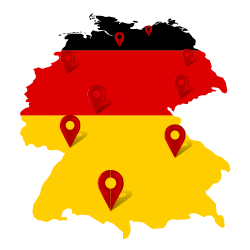Germany Streamlines Work Visa Process: Top 25 High-Demand Jobs for Easier Entry


 Oct 30, 2024
Oct 30, 2024
Germany's Workforce Shortage Creates New Opportunities for Skilled Foreign Professionals
Germany’s economy, one of Europe’s strongest, is currently facing an unprecedented labor shortage, creating exciting prospects for skilled professionals worldwide. The European Labour Authority (ELA) reports that over 70 occupations in Germany now have significant gaps in their workforce. This presents a unique opportunity for skilled foreign workers to enter a country with high demand across sectors like healthcare, IT, manufacturing, and construction. Germany’s economy needs up to 400,000 new skilled workers each year, particularly in the healthcare and tech sectors, to support growth and stability.
Germany’s Top 25 In-Demand Professions
With labor shortages impacting key industries, Germany is looking for skilled professionals in roles that include:
1. Transportation: Heavy truck, lorry, bus, tram, and train drivers, as well as railway operators (brake, signal, and switch).
2. Manufacturing and Construction: Machine operators for various industries, cabinet makers, spray painters, varnishers, bricklayers, and construction supervisors.
3. Skilled Trades: Electricians, plumbers, fitters, bakers, pastry cooks, butchers, fishmongers, and other food preparers.
4. Healthcare: Nursing associates, dental assistants, medical technicians, physiotherapists, audiologists, and speech therapists.
5. Engineering and Technology: Engineering technicians (electronic, electrical, and civil engineering), applications programmers, software developers, and system analysts.
6. Education: Early childhood educators and primary school teachers.
7. Other Professions: Clerks (personnel, transport, accounting, and bookkeeping), firefighters, and forestry workers.
These professions represent key areas where Germany’s economy is experiencing the most critical shortages, allowing skilled foreign professionals with relevant expertise to more easily secure work visas in these fields.
New Immigration Rules for Skilled Workers
In response to this labor shortage, Germany has updated its immigration policies to simplify the process for foreign professionals. Citizens from the EU/EEA, along with those from Australia, Canada, Japan, New Zealand, and the US, don’t require a work visa to enter Germany. However, workers from countries such as India will still need a visa and residence permit, with the process becoming more accessible through recent reforms:
Germany’s new Opportunity Card and reformed visa pathways open doors for skilled workers, creating a favorable environment for those looking to establish their careers in a country where their expertise is highly valued.